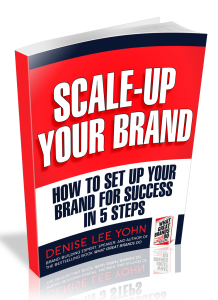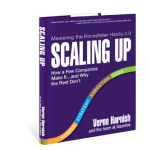A New Scale-Up Your Brand Workbook to Solve the Problems of Scaling Companies
In 2017, are you looking to grow significantly? Expand your scope? Hit a new milestone? If you’re a small- or mid-sized business that’s planning to grow into a larger enterprise — or maybe you run a later-stage start-up that’s headed toward a Series C or even an IPO — you need a solid strategic brand platform. To help you, I’ve developed a new workbook, Scale-Up Your Brand: How To Set Up Your Brand for Success in 5 Steps. This new workbook is a step-by-step guide to help you develop a strong, valuable, sustainable brand strategy. In it, I lay out the five steps plus a bonus brand assessment tool. Available in digital ($6.99 each) and print ($9.99) form, you can get your copy of this new Scale-Up Your Brand workbook here.
You may recall last year, I ran a series of posts on this very topic — it was one of the most popular series I’ve published. Now, I’ve compiled all that content and improved on and synthesized it into 36 pages packed with exercises, instructions, and helpful tips, plus room for note-taking and documenting your progress and decisions. In addition to the workbook, I’m also introducing a workshop in which I will take you and your team through the workbook exercises and other valuable content in a experience custom-tailored to your specific needs. Learn more about this one-day, hands-on, fast-paced workshop here and special introductory pricing here.
I’ve spending so much time and energy on helping companies that want to scale because I’ve seen too many organizations fail to cross the chasm between their humble beginnings and their grand aspirations. While many different dynamics cause such a high failure rate, one of the most critical is the lack of a clear, robust, vital brand strategy. When you don’t have a strong strategic brand platform, you end up with problems of scaling companies like these:
- Over reliance on product strategy. In this scenario, your first product is a hit but you have nothing else to sustain that initial bump — or everything else in your pipeline fails to match initial demand levels. To establish your brand, you’ve relied on product attributes or functionality that can be easily copied or de-valued by the next new thing, so your brand hasn’t developed deep customer connections and doesn’t sustain resonance.
- Lack of alignment in your organization. Your employees, investors, and sometimes even partners disagree on how to grow and evolve the company. You think everyone is on the same page about where you’re going and how to get there, but now people are making decisions that detract from that vision or contradict each other. It’s only going to get worse as you add people who are being recruited, trained, and directed at cross-purposes.
- No true north to guide your own decision-making. Founders in this scenario struggle with decisions about what to say “yes” and “no” to. You had an original product idea and for awhile that seemed to be the right track, but now it seems you might be better off going in a different direction. Or maybe a new opportunity has arisen and you’re not sure if it makes sense for you to pursue it.
- Competitive vulnerability. You started with a unique value proposition, but now there are many more players and your brand is getting lost in the clutter. You no longer know the optimal position for your brand in the competitive landscape — or even who you should be competing with.
- Disparate communications and offerings. You’ve added lots of different products, programs, channels, and/or touchpoints. Each has a slightly different emphasis and some seem to be more relevant to their context than to your core brand idea. In this scenario, your customers — and sometimes your employees — get confused about what your brand stands for.
Maybe you see yourself in one — or all — of these scenarios?! Please understand that my intention is not to shame or scare you into developing a strategic brand platform. On the contrary, my goal is to help you do it.
Thankfully, brand strategy isn’t as complicated as brain surgery. I’ve found almost every business leader is capable of developing a strong brand strategy, but a little experience and perspective does help. So I’ve taken all the learnings I’ve gleaned from working on brands for the past 25+ years and packaged them into this workbook and workshop. I’ve actually learned a lot more — and am still learning — so I hope to add to and improve these resources going forward. But for now, I hope you will find them helpful.
Please let me know about your experiences working through the workbook and any questions you might have about scaling.
related:


